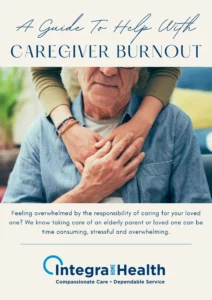If your loved one was recently diagnosed with Lewy body dementia, you might be feeling relief at finally having a diagnosis. You might also be wondering to yourself, “What do I need to know now?”
First, know you’re not alone. Lewy body dementia (LBD) affects an estimated 1.4 million individuals and their families in the United States. Many sources of help are available, from in-person and virtual support groups to respite care, assisted living, and memory care communities.
When you’re coping with a Lewy body dementia diagnosis, it can be very helpful to educate yourself on the disease. This can not only help prepare you and your family for the future but also reduce anxiety when new symptoms develop.
Here are five things you need to know about Lewy body dementia.
1. Lewy body dementia is an umbrella term.
There are two diagnoses of Lewy body dementia — dementia with Lewy bodies (DLB) and Parkinson’s disease dementia.
Lewy bodies are made of a protein found in the brain that plays an important role in communication between brain cells. When these proteins clump together inside neurons, they damage cells and cause them to slowly die.
Your loved one’s symptoms — and the type of LBD they have — will depend on where in the brain the proteins cause damage.
For example, if your loved one’s symptoms first started out as problems with movement and then progressed to impaired thinking or fluctuations in cognition, then they will most likely be diagnosed with Parkinson’s disease dementia.
On the other hand, if your loved one first had a loss of function in information processing, perception, thought, and language or hallucinations, and behavioral problems, then they will most likely be diagnosed with dementia with Lewy bodies.
Regardless of the initial symptoms, all types of Lewy body dementia will develop very similar symptoms that will progress and worsen over time.
2. Lewy body dementia is the second most common form of dementia.
There are crucial differences between Lewy body dementia and Alzheimer’s disease— the most common form of dementia.
For example, people with Lewy body dementia often experience unpredictable changes in cognition throughout the day. People with Alzheimer’s, on the other hand, tend to have more trouble in the late afternoon and evening — a symptom known as sundowning.
Another example: People with Lewy body dementia tend to have more visual hallucinations and movement issues. The hallmarks of Alzheimer’s, on the other hand, include memory loss and trouble performing familiar tasks.
The most common symptoms of LBD include:
- Problems in thinking, such as inattention, lack of judgment, loss of insight, and decline in problem-solving and organizational skill
- Fluctuations in attention, alertness, and wakefulness
- Problems with movement, such as tremors, stiffness, slowness, and difficulty walking
- Recurrent, visual hallucinations
- Sleep disorders, such as vivid dreaming and excessive movement while asleep
- Behavioral and mood symptoms, including depression, apathy, anxiety, agitation, delusions, or paranoia
- Changes in blood pressure control, temperature regulation, and bladder and bowel function
3. What works for Alzheimer’s disease might not work for Lewy body dementia.
One of the biggest things family caregivers should know about Lewy body dementia is that many medicines prescribed to people with Alzheimer’s can have severe, adverse side effects in someone with Lewy body dementia.
For example, antipsychotics used to treat hallucinations, delusions, or agitation in people with Alzheimer’s can cause increased confusion, extreme sleepiness, and low blood pressure as well as high fever, muscle rigidity, and kidney failure in someone with Lewy body dementia.
To avoid dangerous medication reactions, an accurate and timely diagnosis of Lewy body dementia is essential. If your loved one exhibits any of these side effects, contact their doctor immediately.
4. Caring for someone with Lewy body dementia is unpredictable.
Unlike Alzheimer’s disease, which progresses through stages relatively uniformly, Lewy body dementia symptoms can significantly fluctuate. One day, your loved one may function fairly well. The next day, they might be totally disengaged with periods of mental fog.
That’s why caring for a person with Lewy body dementia requires frequent assessment and reassessment. Your loved one might be able to live at home with careful monitoring and supervision today, but next month they might experience a sudden decline in functioning or exhibit unpredictable behaviors that can result in visits to the emergency room.
As a caregiver, it’s important that you plan for the future and are prepared for emergencies. Discuss options such as home care, assisted living, and memory care. An assisted living community that has a memory care community on the same campus can allow your loved one to age in place, getting the assistance, socialization, and compassionate care they need — and deserve — while also allowing you to have some peace of mind.
5. There are many approaches to handling symptoms.
As a family caregiver for a loved one with Lewy body dementia, you shouldn’t go through this alone. There are many types of specialists and therapists who can help you and your loved one manage their disease and maintain day-to-day functionality.
For example:
- Physical therapists can help with movement problems.
- Speech therapists may help with voice volume and projection as well as swallowing difficulties.
- Occupational therapists help find ways to more easily carry out everyday activities, such as eating and bathing.
- Music or art therapists may provide meaningful activities that can reduce anxiety and improve well-being.
As a caregiver, it is critical for you to maintain your own health and well-being. Building a care team allows you to get the support you need and your loved one to get the care they need. And don’t feel guilty about asking for support, either. Or at least try not, too. Remember, the less stressed — and resentful — you are, the better able you’ll be to provide the best care for your loved one.

